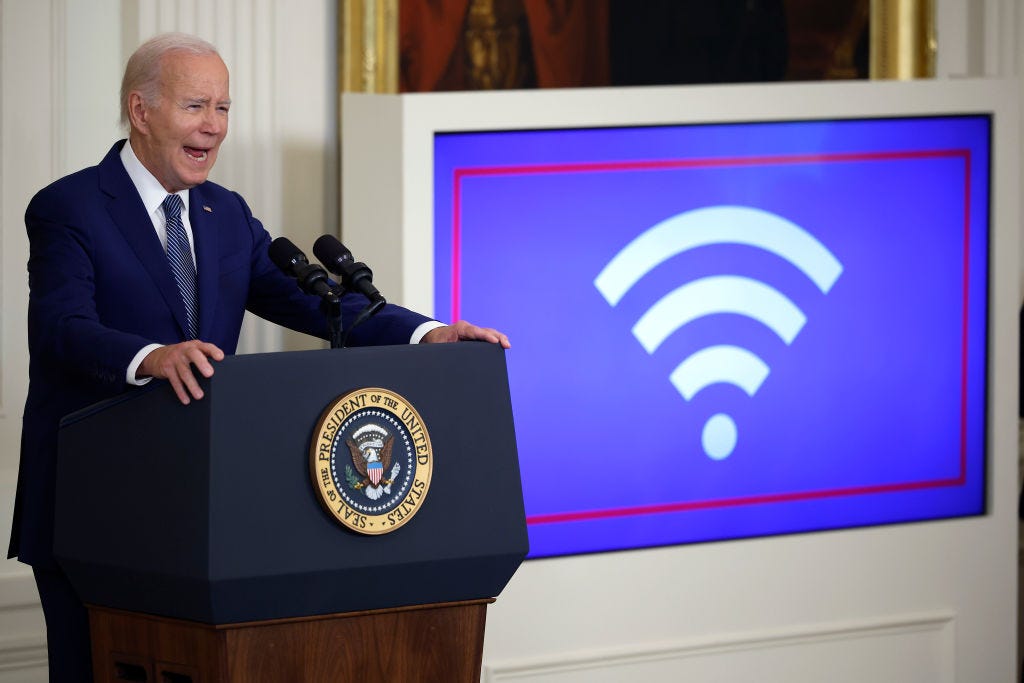TL(PM) DIGEST: Broadband for all
Plus Trump caught committing crimes on tape, new COVID vaccines slowed by red tape, and how news intake might affect political polarization

1. Biden administration moves to make high-speed internet access universal by 2030
What happened? As part of the rollout of the bi-partisan infrastructure legislation from 2021, the Biden administration announced yesterday that it is dispersing $42 billion to all 50 states and U.S. territories to make high-speed broadband available to everyone by 2030.
Why does it matter? High-speed internet is critical for modern business and commerce, healthcare, government services, and personal use. An estimated 8.5 million locations across the country lack access to reliable broadband. According to Reuters, under the new Biden initiative:
Texas and California—the two most populous U.S. states—top the funding list at $3.1 billion and $1.9 billion, respectively. But other, less populous states like Virginia, Alabama and Louisiana cracked the top 10 list for funding due to lack of broadband access. These states have large rural areas with less internet connectivity than their major cities.
"It's the biggest investment in high-speed internet ever. Because for today's economy to work for everyone, internet access is just as important as electricity, or water, or other basic services," Biden said in a White House address on Monday.
TLP’s take: Public infrastructure investments such as this one on high-speed broadband are essential to U.S. economic development and individual well-being. President Biden and the bi-partisan team of legislators in Congress who passed the infrastructure act deserve a round of applause for a job well done. This is the government at its best in terms of delivering critical services for American taxpayers.
2. Trump caught on tape committing crimes
What happened? CNN obtained audio of former president Donald Trump acknowledging his continued possession of classified war plans and the fact that he could not de-classify them after he left office.
Why does it matter? This is as close to a smoking gun as you can get in this case. While the existence of this recording and the substance of its contents were revealed in the federal indictment against Trump, it’s still noteworthy to hear the ex-president essentially admit to wrongdoing on tape.
TLP’s take: This audio probably won’t sway Trump supporters beyond some wavering voters on the margins. But it’s still important for the rest of the country to hear and understand that the former president effectively admit his wrongdoing—and undermine his own already-absurd public defenses of his conduct in the process.
3. Red tape slows new COVID vaccines
What happened? The New York Times reports that a $5 billion program to develop new coronavirus vaccines is “running up against bureaucratic hassles and regulatory uncertainty.” These new vaccines are delivered via nasal sprays or inhalers, and some protect against a wider variety of coronaviruses—not just COVID-19 and its variants.
Why does it matter? Being better prepared for the next coronavirus will save lives and spare us the sort of widespread social disruption that accompanied the COVID-19 pandemic. But unlike the effort to develop the first COVID vaccines in 2020, this suite of programs appears to have too little funding to move at anything faster than a normal pace of vaccine development.
TLP’s take: This program should receive the support it deserves, but the urgency to develop new coronavirus vaccines just isn’t there—especially in Congress. At this point, we’ll just have to take what we can get in terms of funding and hope it’s enough in the face of normal bureaucratic hurdles.
4. Countries with relatively stable politics report more direct intake and trust of news
What happened? The Reuters Institute’s massive new study on digital news finds that Nordic countries such as Finland, Norway, Denmark, and Sweden have some of the highest direct intake of news by citizens—meaning people go directly to news sites or news apps as opposed to getting news filtered through social media platforms or aggregators.
Why does it matter? These Nordic countries also exhibit some of the highest levels of trust in news measured across the globe—and perhaps not coincidentally, less polarized politics:
Across markets, overall trust in news (40%) and trust in the sources people use themselves (46%) are down by a further 2 percentage points this year. As in previous years, we find the highest trust levels in countries such as Finland (69%) and Portugal (58%), with lower trust levels in countries with higher degrees of political polarisation such as the United States (32%), Argentina (30%), Hungary (25%), and Greece (19%).
TLP’s take: Although it’s merely a correlation, it is notable that countries with relatively stable and less polarized politics also exhibit the highest levels of direct news intake and overall trust in the news. In contrast, many countries like America—where only 32 percent of people trust most news and a large proportion of people, particularly young people, get their news (if they get it at all) through intermediaries—end up with more chaotic and polarized politics.
Without some common form of regularly consumed and trusted news brands, it’s nearly impossible for citizens to avoid turning every national event into a “I have my facts, you have yours” phenomenon with few paths for forging consensus. “Post-truth” politics doesn’t happen by accident.
Just one more thing…
Please don’t deface the ancient monuments: a tourist raised a furor in Italy after he carved a love note into the Colosseum in Rome sometime earlier this month, an act of romantic vandalism captured by a viral video and possibly carrying with it a fine of $16,400 and five years in prison.







